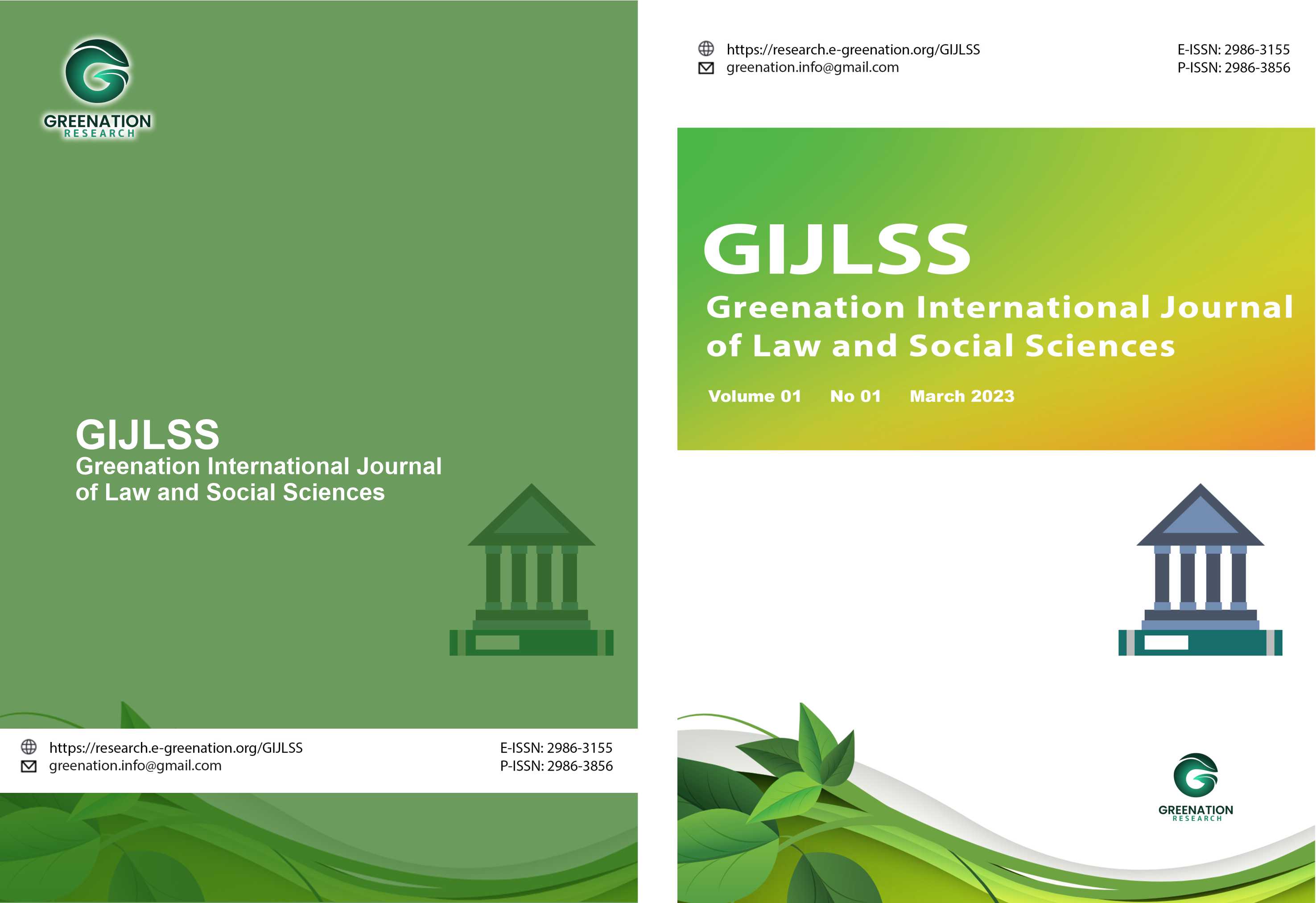Challenges and Formulation of the Legal Framework for Carbon Capture Storage (CCS/CCUS) in Indonesia in Building a Regulatory Basis for Decarbonization Projects in the Oil and Gas Sector
DOI:
https://doi.org/10.38035/gijlss.v3i3.576Keywords:
Carbon Capture Storage, Environmental Law, Decarbonization, Correctional Law, Oil and Gas SectorAbstract
Global climate change demands that every country accelerate decarbonization measures, including Indonesia, which is committed to achieving Net Zero Emissions by 2060. One potential mitigation strategy is the implementation of Carbon Capture Storage (CCS) and Carbon Capture Utilization and Storage (CCUS) technology in the oil and gas sector. However, the implementation of CCS/CCUS in Indonesia still faces significant legal and institutional challenges. This study aims to analyze the normative, institutional, and policy barriers to CCS/CCUS implementation and to formulate an ideal legal framework to support decarbonization projects in the oil and gas sector. The method used is normative legal research with legislative, conceptual, and comparative approaches. The results show that the absence of lex specialis related to CCS/CCUS causes legal uncertainty, especially in the aspects of licensing, post-carbon storage environmental responsibilities, and legal protection for investors. In addition, overlapping authorities between the Ministry of Energy and Mineral Resources, the Ministry of Environment and Forestry, and the Upstream Oil and Gas Regulatory Special Task Force (SKK Migas) weaken the effectiveness of supervision. Therefore, the establishment of specific regulations and integrated institutions is needed to govern the implementation of CCS/CCUS, including establishing a liability regime and economic incentive mechanisms. Therefore, the formulation of a comprehensive CCS/CCUS legal framework is a key prerequisite for the success of decarbonization projects in the oil and gas sector in Indonesia.
References
Abisono, F. G. (2024). Di Bawah Bayang-Bayang Perubahan Iklim: Transformasi Negara Pembangunan dan Agenda Transisi Energi di Indonesia. Politika: Jurnal Ilmu Politik, 15(1), 95-118.
Adiwardhana, A. (2023). Penggunaan Teknologi Ccs/Ccus Untuk Mendukung Penurunan Emisi Grk Sektor Energi. Buletin Pertamina, 9(2), 125.
Agustina, R., Aditiameri, Ahmad, A., Tebai, N., Fidhatami, I. I., La Habi, M., . . . Azizah, A. (2025). Konservasi Sumber Daya Alam dan Lingkungan. Padang: Azzia Karya Bersama.
Amalia, I., Isma, N., & Noviarani, D. (2025). Penerapan Prinsip Polluter Pays Dalam Corporate State Responsibility: Perspektif Hukum Perusahaan. Jurnal Ilmiah Wahana Pendidikan, 11(6C), 66-77.
Anshori, I., Setyawan, A., & Firdaus, A. (2024). IMPLIKASI KEBIJAKAN PENGELOLAAN SUMBER DAYA ALAM TERHADAP ASPEK KEBERLANJUTAN SOSIAL DAN LINGKUNGAN. JOURNAL OF LAW AND NATION, 3(1), 123-131.
Antarissubhi, H., Serang, R., Leda, J., Salamena, G. E., Pagoray, G. L., Gusty, S., & Safar, A. (2023). Krisis Iklim Global di Indonesia (Dampak dan Tantangan). Makassar: Tohar Media.
Aufat, M. F., Arjunita, S., Efika, N., & Hasni, H. (2025). ANALISIS PENTINGNYA ASPEK HUKUM DALAM STUDI KELAYAKAN BISNIS SEBAGAI JAMINAN KEABSAHAN USAHA. Journal of Information Systems Management and Digital Business, 2(4), 314-325.
Budi, A. S., & Falson, J. (2024). Carbon Capture Storage dalam Pengelolaan Barang Milik Negara. JURNAL MANAJEMEN KEUANGAN PUBLIK, 8(2), 104-120.
Budiman, A. (2024). CCUS (Carbon Capture, Utilization, and Storage): Teknologi Penangkapan, Utilisasi, dan Penyimpanan CO2. Yogyakarta: UGM PRESS.
Chandra, F., Diar, A., & Hartati, H. (2024). Konstitusi Hijau (Green Constitution) dalam Upaya Pelestarian Lingkungan Hidup yang Berkeadilan. Jurnal Penelitian Inovatif, 4(3), 889-896.
Fransiskus, F., & Rifawan, A. (2025). Peran Indonesia Sebagai Norm Entrepreneur Dalam Konsepsi Sentralitas ASEAN Melalui Inisiatif Karbon Lintas Batas Berbasis Teknologi Carbon, Capture and Storage (CCS). Padjadjaran Journal of International Relations, 7(1), 83-100.
Irma, M. F., & Gusmira, E. (2024). Tingginya Kenaikan Suhu Akibat Peningkatan Emisi Gas Rumah Kaca Di Indonesia. JSSIT: Jurnal Sains dan Sains Terapan, 2(1).
Kennedy, P. S. (2025). Kajian Normatif atas Pengukuran, Pelaporan, dan Verifikasi dalam Perdagangan Karbon. IKRA-ITH HUMANIORA: Jurnal Sosial dan Humaniora, 9(1), 154-166.
Mahardhika, Z. M., Hapsari, I. M., & Rajib, R. K. (2024). Urgensi Reformasi Hukum Lingkungan terhadap Perubahan Iklim di Indonesia. Jurnal Kebijakan Pembangunan, 19(2), 235-244.
Osman, A. I., Hefny, M., Abdel Maksoud, M. I., Elgarahy, A. M., & Rooney, D. W. (2021). Recent advances in carbon capture storage and utilisation technologies: a review. Environmental Chemistry Letters, 19(2), 797-849.
Downloads
Published
How to Cite
Issue
Section
License
Copyright (c) 2025 Sri Wisnuaji, Faisal Santiago

This work is licensed under a Creative Commons Attribution 4.0 International License.
Copyright :
Authors who publish their manuscripts in this journal agree to the following conditions:
- Copyright in each article belongs to the author.
- The author acknowledges that the Greenation International Journal of Law and Social Sciences (GIJLSS) has the right to be the first to publish under a Creative Commons Attribution 4.0 International license (Attribution 4.0 International CC BY 4.0).
- Authors can submit articles separately, arrange the non-exclusive distribution of manuscripts that have been published in this journal to other versions (for example, sent to the author's institutional repository, publication in a book, etc.), by acknowledging that the manuscript has been published for the first time at GIJLSS.























